ECS 4580: Free Trade Benefits, Costs, and COVID-19 Impact Analysis
VerifiedAdded on 2023/06/18
|11
|3202
|436
Essay
AI Summary
This essay explores the benefits and costs of free trade, analyzing its validity in the post-COVID-19 era. It begins with an introduction to free trade principles, followed by a literature review examining various perspectives on its advantages, such as enhanced economic growth, increased exports, and lower consumer prices, and disadvantages, including job losses and potential exploitation of workers. The analysis delves into the impact of the COVID-19 pandemic on international trade, highlighting disruptions in supply chains, reduced demand, and trade restrictions imposed by governments. The essay uses examples like the shift in demand for medical equipment and the decline in automobile exports to illustrate these effects, ultimately assessing whether the free trade argument remains valid in light of these challenges.
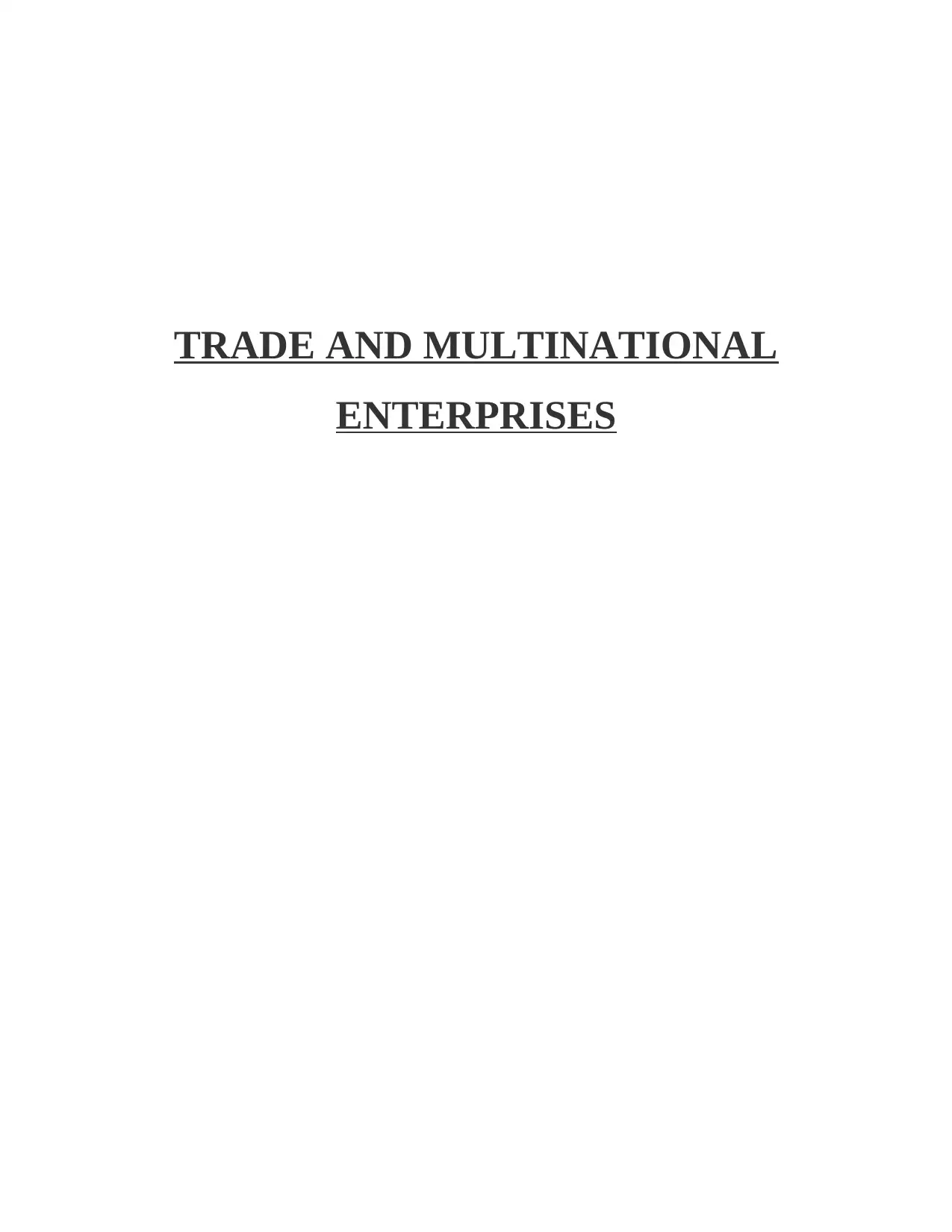
TRADE AND MULTINATIONAL
ENTERPRISES
ENTERPRISES
Paraphrase This Document
Need a fresh take? Get an instant paraphrase of this document with our AI Paraphraser
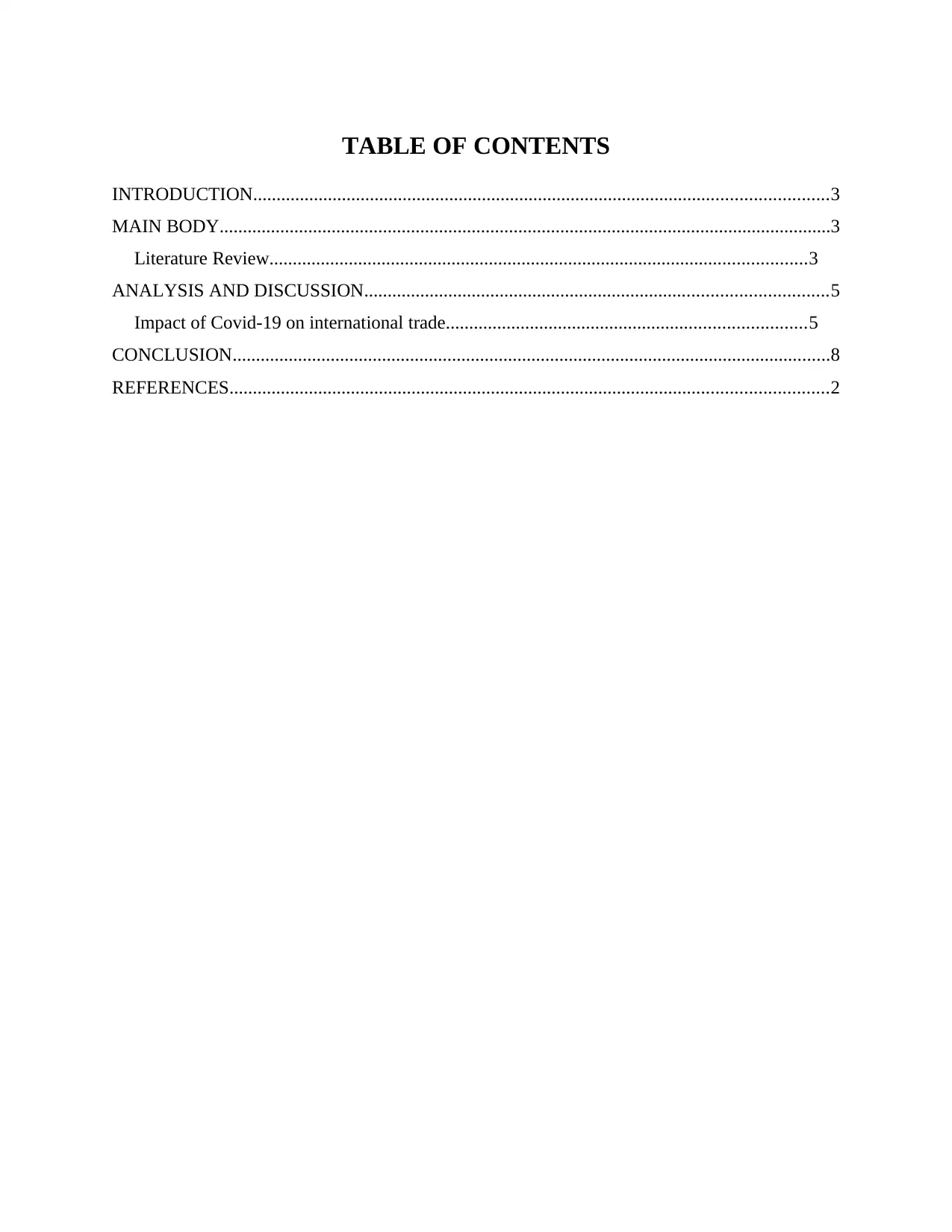
TABLE OF CONTENTS
INTRODUCTION...........................................................................................................................3
MAIN BODY...................................................................................................................................3
Literature Review...................................................................................................................3
ANALYSIS AND DISCUSSION...................................................................................................5
Impact of Covid-19 on international trade.............................................................................5
CONCLUSION................................................................................................................................8
REFERENCES................................................................................................................................2
INTRODUCTION...........................................................................................................................3
MAIN BODY...................................................................................................................................3
Literature Review...................................................................................................................3
ANALYSIS AND DISCUSSION...................................................................................................5
Impact of Covid-19 on international trade.............................................................................5
CONCLUSION................................................................................................................................8
REFERENCES................................................................................................................................2
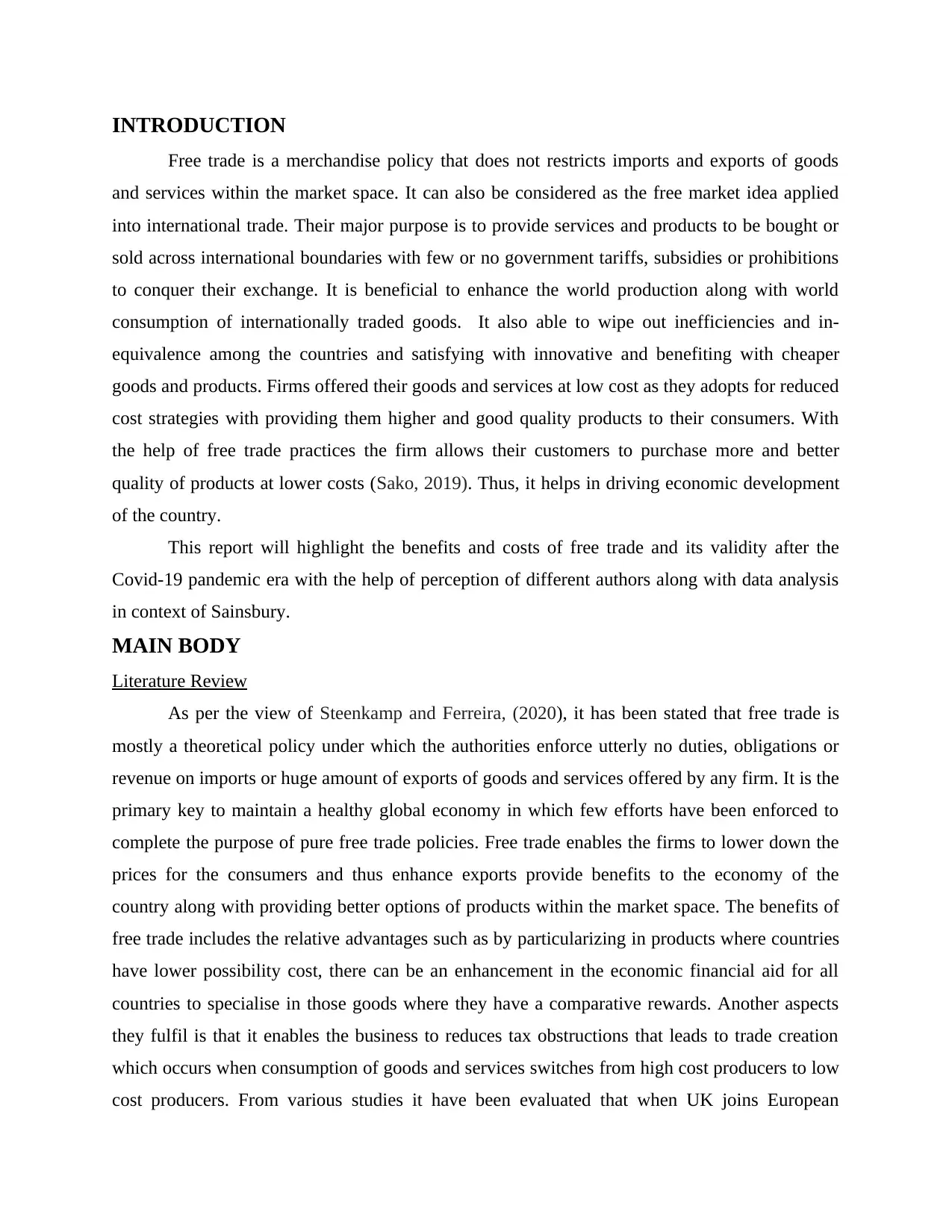
INTRODUCTION
Free trade is a merchandise policy that does not restricts imports and exports of goods
and services within the market space. It can also be considered as the free market idea applied
into international trade. Their major purpose is to provide services and products to be bought or
sold across international boundaries with few or no government tariffs, subsidies or prohibitions
to conquer their exchange. It is beneficial to enhance the world production along with world
consumption of internationally traded goods. It also able to wipe out inefficiencies and in-
equivalence among the countries and satisfying with innovative and benefiting with cheaper
goods and products. Firms offered their goods and services at low cost as they adopts for reduced
cost strategies with providing them higher and good quality products to their consumers. With
the help of free trade practices the firm allows their customers to purchase more and better
quality of products at lower costs (Sako, 2019). Thus, it helps in driving economic development
of the country.
This report will highlight the benefits and costs of free trade and its validity after the
Covid-19 pandemic era with the help of perception of different authors along with data analysis
in context of Sainsbury.
MAIN BODY
Literature Review
As per the view of Steenkamp and Ferreira, (2020), it has been stated that free trade is
mostly a theoretical policy under which the authorities enforce utterly no duties, obligations or
revenue on imports or huge amount of exports of goods and services offered by any firm. It is the
primary key to maintain a healthy global economy in which few efforts have been enforced to
complete the purpose of pure free trade policies. Free trade enables the firms to lower down the
prices for the consumers and thus enhance exports provide benefits to the economy of the
country along with providing better options of products within the market space. The benefits of
free trade includes the relative advantages such as by particularizing in products where countries
have lower possibility cost, there can be an enhancement in the economic financial aid for all
countries to specialise in those goods where they have a comparative rewards. Another aspects
they fulfil is that it enables the business to reduces tax obstructions that leads to trade creation
which occurs when consumption of goods and services switches from high cost producers to low
cost producers. From various studies it have been evaluated that when UK joins European
Free trade is a merchandise policy that does not restricts imports and exports of goods
and services within the market space. It can also be considered as the free market idea applied
into international trade. Their major purpose is to provide services and products to be bought or
sold across international boundaries with few or no government tariffs, subsidies or prohibitions
to conquer their exchange. It is beneficial to enhance the world production along with world
consumption of internationally traded goods. It also able to wipe out inefficiencies and in-
equivalence among the countries and satisfying with innovative and benefiting with cheaper
goods and products. Firms offered their goods and services at low cost as they adopts for reduced
cost strategies with providing them higher and good quality products to their consumers. With
the help of free trade practices the firm allows their customers to purchase more and better
quality of products at lower costs (Sako, 2019). Thus, it helps in driving economic development
of the country.
This report will highlight the benefits and costs of free trade and its validity after the
Covid-19 pandemic era with the help of perception of different authors along with data analysis
in context of Sainsbury.
MAIN BODY
Literature Review
As per the view of Steenkamp and Ferreira, (2020), it has been stated that free trade is
mostly a theoretical policy under which the authorities enforce utterly no duties, obligations or
revenue on imports or huge amount of exports of goods and services offered by any firm. It is the
primary key to maintain a healthy global economy in which few efforts have been enforced to
complete the purpose of pure free trade policies. Free trade enables the firms to lower down the
prices for the consumers and thus enhance exports provide benefits to the economy of the
country along with providing better options of products within the market space. The benefits of
free trade includes the relative advantages such as by particularizing in products where countries
have lower possibility cost, there can be an enhancement in the economic financial aid for all
countries to specialise in those goods where they have a comparative rewards. Another aspects
they fulfil is that it enables the business to reduces tax obstructions that leads to trade creation
which occurs when consumption of goods and services switches from high cost producers to low
cost producers. From various studies it have been evaluated that when UK joins European
⊘ This is a preview!⊘
Do you want full access?
Subscribe today to unlock all pages.

Trusted by 1+ million students worldwide
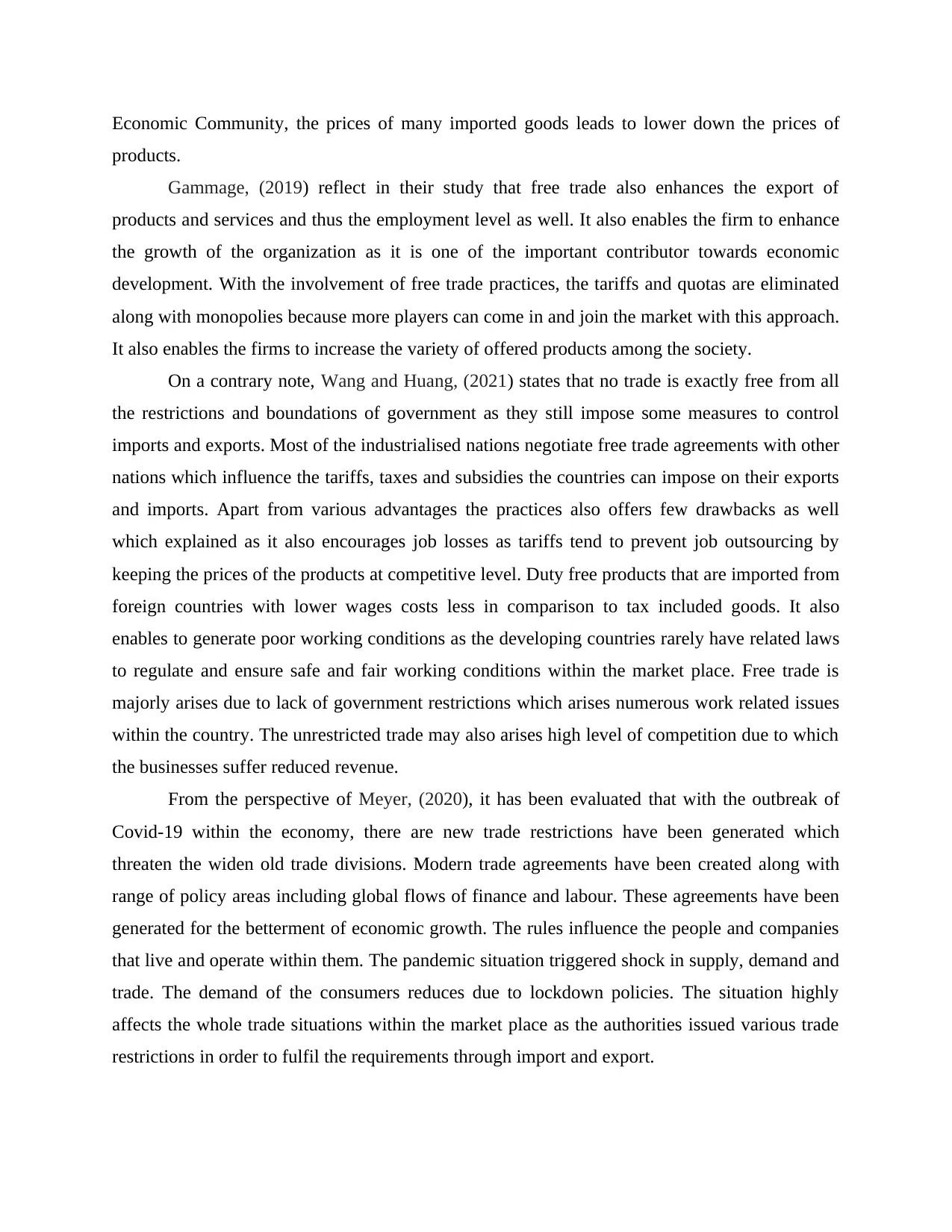
Economic Community, the prices of many imported goods leads to lower down the prices of
products.
Gammage, (2019) reflect in their study that free trade also enhances the export of
products and services and thus the employment level as well. It also enables the firm to enhance
the growth of the organization as it is one of the important contributor towards economic
development. With the involvement of free trade practices, the tariffs and quotas are eliminated
along with monopolies because more players can come in and join the market with this approach.
It also enables the firms to increase the variety of offered products among the society.
On a contrary note, Wang and Huang, (2021) states that no trade is exactly free from all
the restrictions and boundations of government as they still impose some measures to control
imports and exports. Most of the industrialised nations negotiate free trade agreements with other
nations which influence the tariffs, taxes and subsidies the countries can impose on their exports
and imports. Apart from various advantages the practices also offers few drawbacks as well
which explained as it also encourages job losses as tariffs tend to prevent job outsourcing by
keeping the prices of the products at competitive level. Duty free products that are imported from
foreign countries with lower wages costs less in comparison to tax included goods. It also
enables to generate poor working conditions as the developing countries rarely have related laws
to regulate and ensure safe and fair working conditions within the market place. Free trade is
majorly arises due to lack of government restrictions which arises numerous work related issues
within the country. The unrestricted trade may also arises high level of competition due to which
the businesses suffer reduced revenue.
From the perspective of Meyer, (2020), it has been evaluated that with the outbreak of
Covid-19 within the economy, there are new trade restrictions have been generated which
threaten the widen old trade divisions. Modern trade agreements have been created along with
range of policy areas including global flows of finance and labour. These agreements have been
generated for the betterment of economic growth. The rules influence the people and companies
that live and operate within them. The pandemic situation triggered shock in supply, demand and
trade. The demand of the consumers reduces due to lockdown policies. The situation highly
affects the whole trade situations within the market place as the authorities issued various trade
restrictions in order to fulfil the requirements through import and export.
products.
Gammage, (2019) reflect in their study that free trade also enhances the export of
products and services and thus the employment level as well. It also enables the firm to enhance
the growth of the organization as it is one of the important contributor towards economic
development. With the involvement of free trade practices, the tariffs and quotas are eliminated
along with monopolies because more players can come in and join the market with this approach.
It also enables the firms to increase the variety of offered products among the society.
On a contrary note, Wang and Huang, (2021) states that no trade is exactly free from all
the restrictions and boundations of government as they still impose some measures to control
imports and exports. Most of the industrialised nations negotiate free trade agreements with other
nations which influence the tariffs, taxes and subsidies the countries can impose on their exports
and imports. Apart from various advantages the practices also offers few drawbacks as well
which explained as it also encourages job losses as tariffs tend to prevent job outsourcing by
keeping the prices of the products at competitive level. Duty free products that are imported from
foreign countries with lower wages costs less in comparison to tax included goods. It also
enables to generate poor working conditions as the developing countries rarely have related laws
to regulate and ensure safe and fair working conditions within the market place. Free trade is
majorly arises due to lack of government restrictions which arises numerous work related issues
within the country. The unrestricted trade may also arises high level of competition due to which
the businesses suffer reduced revenue.
From the perspective of Meyer, (2020), it has been evaluated that with the outbreak of
Covid-19 within the economy, there are new trade restrictions have been generated which
threaten the widen old trade divisions. Modern trade agreements have been created along with
range of policy areas including global flows of finance and labour. These agreements have been
generated for the betterment of economic growth. The rules influence the people and companies
that live and operate within them. The pandemic situation triggered shock in supply, demand and
trade. The demand of the consumers reduces due to lockdown policies. The situation highly
affects the whole trade situations within the market place as the authorities issued various trade
restrictions in order to fulfil the requirements through import and export.
Paraphrase This Document
Need a fresh take? Get an instant paraphrase of this document with our AI Paraphraser
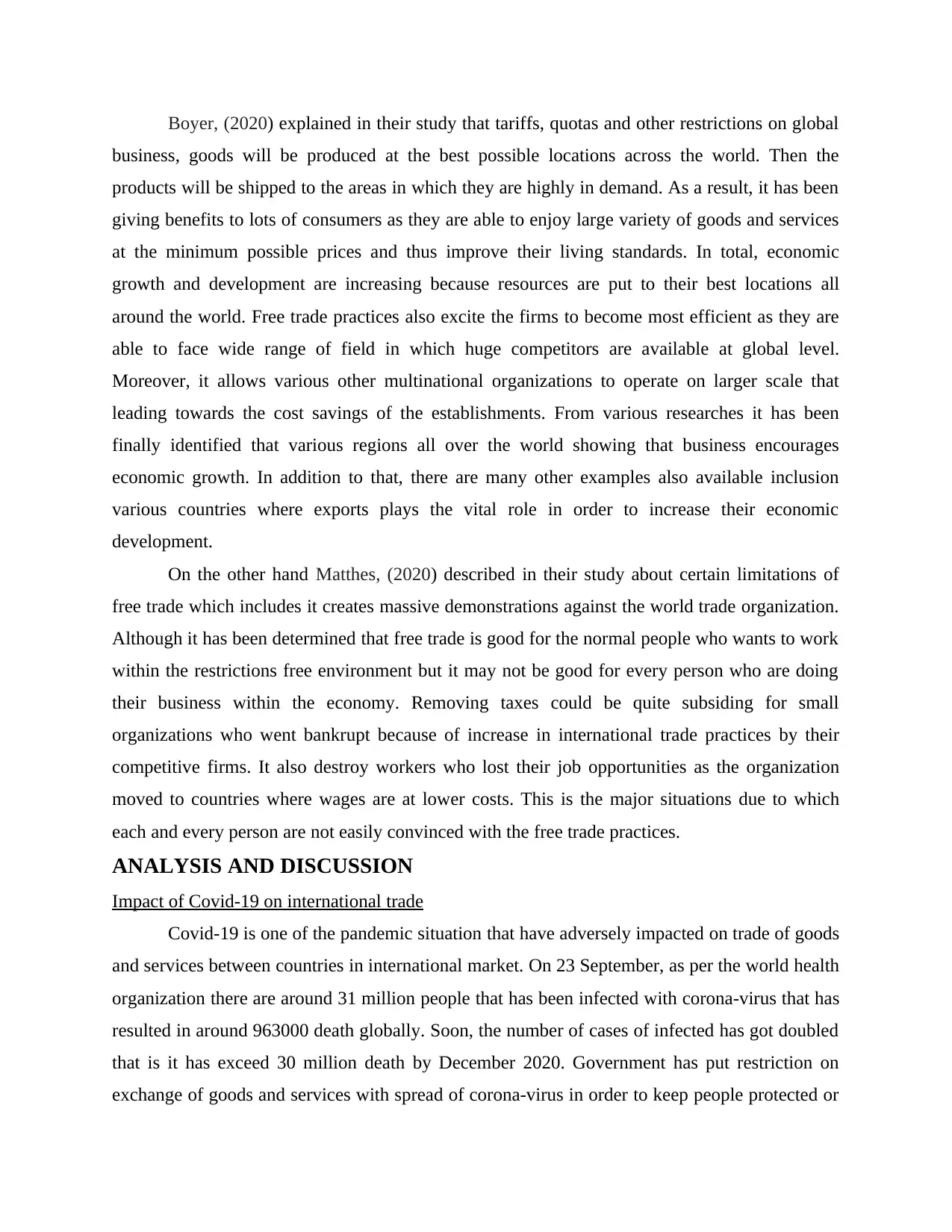
Boyer, (2020) explained in their study that tariffs, quotas and other restrictions on global
business, goods will be produced at the best possible locations across the world. Then the
products will be shipped to the areas in which they are highly in demand. As a result, it has been
giving benefits to lots of consumers as they are able to enjoy large variety of goods and services
at the minimum possible prices and thus improve their living standards. In total, economic
growth and development are increasing because resources are put to their best locations all
around the world. Free trade practices also excite the firms to become most efficient as they are
able to face wide range of field in which huge competitors are available at global level.
Moreover, it allows various other multinational organizations to operate on larger scale that
leading towards the cost savings of the establishments. From various researches it has been
finally identified that various regions all over the world showing that business encourages
economic growth. In addition to that, there are many other examples also available inclusion
various countries where exports plays the vital role in order to increase their economic
development.
On the other hand Matthes, (2020) described in their study about certain limitations of
free trade which includes it creates massive demonstrations against the world trade organization.
Although it has been determined that free trade is good for the normal people who wants to work
within the restrictions free environment but it may not be good for every person who are doing
their business within the economy. Removing taxes could be quite subsiding for small
organizations who went bankrupt because of increase in international trade practices by their
competitive firms. It also destroy workers who lost their job opportunities as the organization
moved to countries where wages are at lower costs. This is the major situations due to which
each and every person are not easily convinced with the free trade practices.
ANALYSIS AND DISCUSSION
Impact of Covid-19 on international trade
Covid-19 is one of the pandemic situation that have adversely impacted on trade of goods
and services between countries in international market. On 23 September, as per the world health
organization there are around 31 million people that has been infected with corona-virus that has
resulted in around 963000 death globally. Soon, the number of cases of infected has got doubled
that is it has exceed 30 million death by December 2020. Government has put restriction on
exchange of goods and services with spread of corona-virus in order to keep people protected or
business, goods will be produced at the best possible locations across the world. Then the
products will be shipped to the areas in which they are highly in demand. As a result, it has been
giving benefits to lots of consumers as they are able to enjoy large variety of goods and services
at the minimum possible prices and thus improve their living standards. In total, economic
growth and development are increasing because resources are put to their best locations all
around the world. Free trade practices also excite the firms to become most efficient as they are
able to face wide range of field in which huge competitors are available at global level.
Moreover, it allows various other multinational organizations to operate on larger scale that
leading towards the cost savings of the establishments. From various researches it has been
finally identified that various regions all over the world showing that business encourages
economic growth. In addition to that, there are many other examples also available inclusion
various countries where exports plays the vital role in order to increase their economic
development.
On the other hand Matthes, (2020) described in their study about certain limitations of
free trade which includes it creates massive demonstrations against the world trade organization.
Although it has been determined that free trade is good for the normal people who wants to work
within the restrictions free environment but it may not be good for every person who are doing
their business within the economy. Removing taxes could be quite subsiding for small
organizations who went bankrupt because of increase in international trade practices by their
competitive firms. It also destroy workers who lost their job opportunities as the organization
moved to countries where wages are at lower costs. This is the major situations due to which
each and every person are not easily convinced with the free trade practices.
ANALYSIS AND DISCUSSION
Impact of Covid-19 on international trade
Covid-19 is one of the pandemic situation that have adversely impacted on trade of goods
and services between countries in international market. On 23 September, as per the world health
organization there are around 31 million people that has been infected with corona-virus that has
resulted in around 963000 death globally. Soon, the number of cases of infected has got doubled
that is it has exceed 30 million death by December 2020. Government has put restriction on
exchange of goods and services with spread of corona-virus in order to keep people protected or
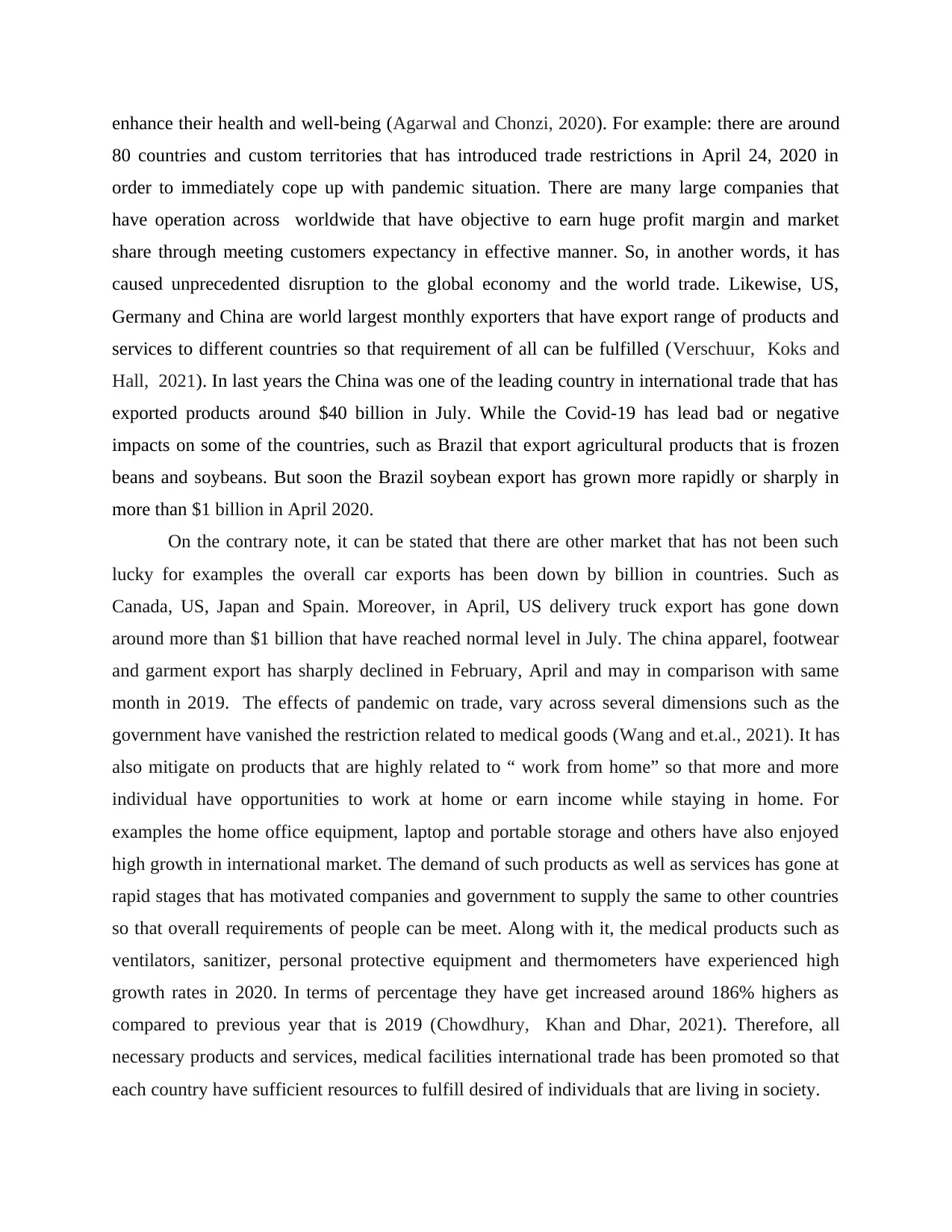
enhance their health and well-being (Agarwal and Chonzi, 2020). For example: there are around
80 countries and custom territories that has introduced trade restrictions in April 24, 2020 in
order to immediately cope up with pandemic situation. There are many large companies that
have operation across worldwide that have objective to earn huge profit margin and market
share through meeting customers expectancy in effective manner. So, in another words, it has
caused unprecedented disruption to the global economy and the world trade. Likewise, US,
Germany and China are world largest monthly exporters that have export range of products and
services to different countries so that requirement of all can be fulfilled (Verschuur, Koks and
Hall, 2021). In last years the China was one of the leading country in international trade that has
exported products around $40 billion in July. While the Covid-19 has lead bad or negative
impacts on some of the countries, such as Brazil that export agricultural products that is frozen
beans and soybeans. But soon the Brazil soybean export has grown more rapidly or sharply in
more than $1 billion in April 2020.
On the contrary note, it can be stated that there are other market that has not been such
lucky for examples the overall car exports has been down by billion in countries. Such as
Canada, US, Japan and Spain. Moreover, in April, US delivery truck export has gone down
around more than $1 billion that have reached normal level in July. The china apparel, footwear
and garment export has sharply declined in February, April and may in comparison with same
month in 2019. The effects of pandemic on trade, vary across several dimensions such as the
government have vanished the restriction related to medical goods (Wang and et.al., 2021). It has
also mitigate on products that are highly related to “ work from home” so that more and more
individual have opportunities to work at home or earn income while staying in home. For
examples the home office equipment, laptop and portable storage and others have also enjoyed
high growth in international market. The demand of such products as well as services has gone at
rapid stages that has motivated companies and government to supply the same to other countries
so that overall requirements of people can be meet. Along with it, the medical products such as
ventilators, sanitizer, personal protective equipment and thermometers have experienced high
growth rates in 2020. In terms of percentage they have get increased around 186% highers as
compared to previous year that is 2019 (Chowdhury, Khan and Dhar, 2021). Therefore, all
necessary products and services, medical facilities international trade has been promoted so that
each country have sufficient resources to fulfill desired of individuals that are living in society.
80 countries and custom territories that has introduced trade restrictions in April 24, 2020 in
order to immediately cope up with pandemic situation. There are many large companies that
have operation across worldwide that have objective to earn huge profit margin and market
share through meeting customers expectancy in effective manner. So, in another words, it has
caused unprecedented disruption to the global economy and the world trade. Likewise, US,
Germany and China are world largest monthly exporters that have export range of products and
services to different countries so that requirement of all can be fulfilled (Verschuur, Koks and
Hall, 2021). In last years the China was one of the leading country in international trade that has
exported products around $40 billion in July. While the Covid-19 has lead bad or negative
impacts on some of the countries, such as Brazil that export agricultural products that is frozen
beans and soybeans. But soon the Brazil soybean export has grown more rapidly or sharply in
more than $1 billion in April 2020.
On the contrary note, it can be stated that there are other market that has not been such
lucky for examples the overall car exports has been down by billion in countries. Such as
Canada, US, Japan and Spain. Moreover, in April, US delivery truck export has gone down
around more than $1 billion that have reached normal level in July. The china apparel, footwear
and garment export has sharply declined in February, April and may in comparison with same
month in 2019. The effects of pandemic on trade, vary across several dimensions such as the
government have vanished the restriction related to medical goods (Wang and et.al., 2021). It has
also mitigate on products that are highly related to “ work from home” so that more and more
individual have opportunities to work at home or earn income while staying in home. For
examples the home office equipment, laptop and portable storage and others have also enjoyed
high growth in international market. The demand of such products as well as services has gone at
rapid stages that has motivated companies and government to supply the same to other countries
so that overall requirements of people can be meet. Along with it, the medical products such as
ventilators, sanitizer, personal protective equipment and thermometers have experienced high
growth rates in 2020. In terms of percentage they have get increased around 186% highers as
compared to previous year that is 2019 (Chowdhury, Khan and Dhar, 2021). Therefore, all
necessary products and services, medical facilities international trade has been promoted so that
each country have sufficient resources to fulfill desired of individuals that are living in society.
⊘ This is a preview!⊘
Do you want full access?
Subscribe today to unlock all pages.

Trusted by 1+ million students worldwide
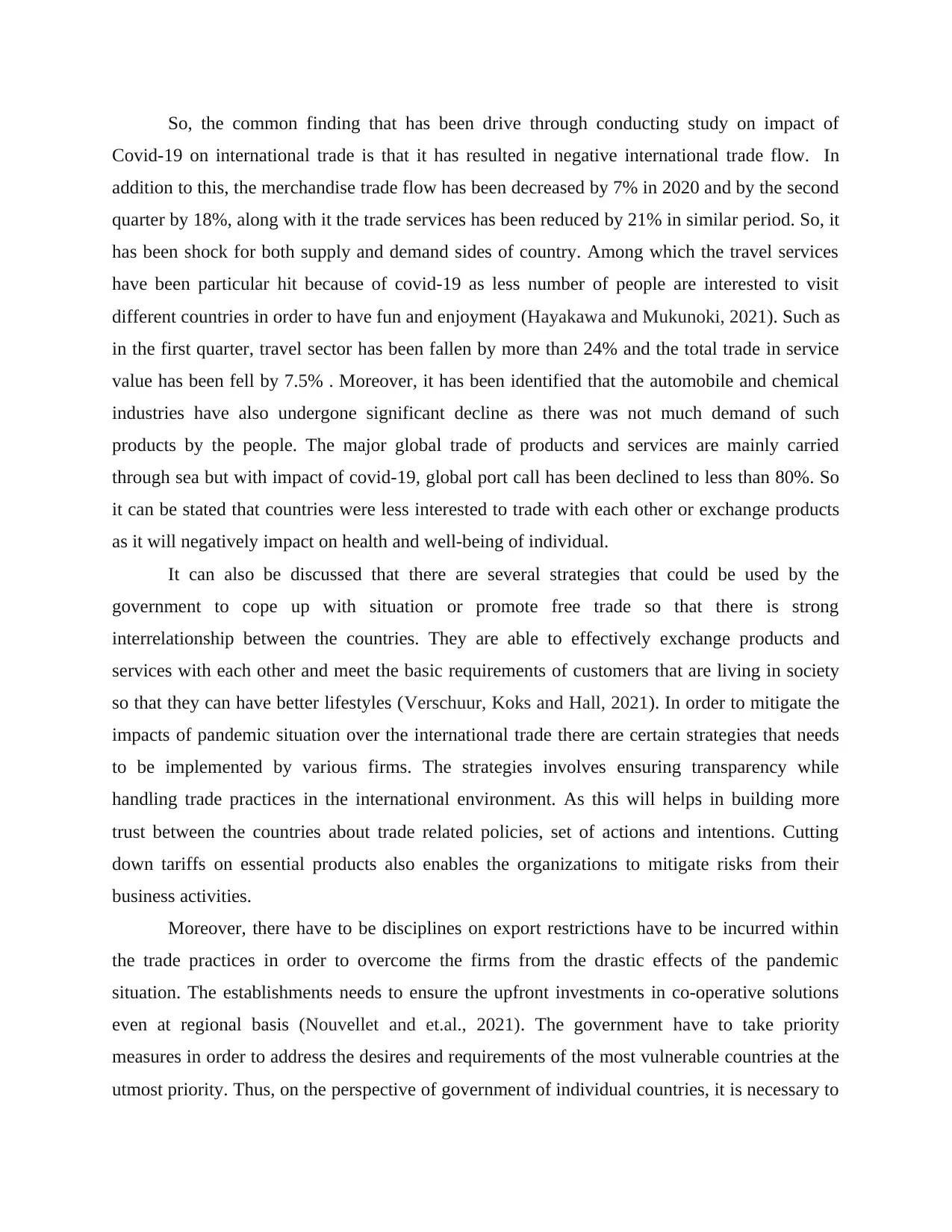
So, the common finding that has been drive through conducting study on impact of
Covid-19 on international trade is that it has resulted in negative international trade flow. In
addition to this, the merchandise trade flow has been decreased by 7% in 2020 and by the second
quarter by 18%, along with it the trade services has been reduced by 21% in similar period. So, it
has been shock for both supply and demand sides of country. Among which the travel services
have been particular hit because of covid-19 as less number of people are interested to visit
different countries in order to have fun and enjoyment (Hayakawa and Mukunoki, 2021). Such as
in the first quarter, travel sector has been fallen by more than 24% and the total trade in service
value has been fell by 7.5% . Moreover, it has been identified that the automobile and chemical
industries have also undergone significant decline as there was not much demand of such
products by the people. The major global trade of products and services are mainly carried
through sea but with impact of covid-19, global port call has been declined to less than 80%. So
it can be stated that countries were less interested to trade with each other or exchange products
as it will negatively impact on health and well-being of individual.
It can also be discussed that there are several strategies that could be used by the
government to cope up with situation or promote free trade so that there is strong
interrelationship between the countries. They are able to effectively exchange products and
services with each other and meet the basic requirements of customers that are living in society
so that they can have better lifestyles (Verschuur, Koks and Hall, 2021). In order to mitigate the
impacts of pandemic situation over the international trade there are certain strategies that needs
to be implemented by various firms. The strategies involves ensuring transparency while
handling trade practices in the international environment. As this will helps in building more
trust between the countries about trade related policies, set of actions and intentions. Cutting
down tariffs on essential products also enables the organizations to mitigate risks from their
business activities.
Moreover, there have to be disciplines on export restrictions have to be incurred within
the trade practices in order to overcome the firms from the drastic effects of the pandemic
situation. The establishments needs to ensure the upfront investments in co-operative solutions
even at regional basis (Nouvellet and et.al., 2021). The government have to take priority
measures in order to address the desires and requirements of the most vulnerable countries at the
utmost priority. Thus, on the perspective of government of individual countries, it is necessary to
Covid-19 on international trade is that it has resulted in negative international trade flow. In
addition to this, the merchandise trade flow has been decreased by 7% in 2020 and by the second
quarter by 18%, along with it the trade services has been reduced by 21% in similar period. So, it
has been shock for both supply and demand sides of country. Among which the travel services
have been particular hit because of covid-19 as less number of people are interested to visit
different countries in order to have fun and enjoyment (Hayakawa and Mukunoki, 2021). Such as
in the first quarter, travel sector has been fallen by more than 24% and the total trade in service
value has been fell by 7.5% . Moreover, it has been identified that the automobile and chemical
industries have also undergone significant decline as there was not much demand of such
products by the people. The major global trade of products and services are mainly carried
through sea but with impact of covid-19, global port call has been declined to less than 80%. So
it can be stated that countries were less interested to trade with each other or exchange products
as it will negatively impact on health and well-being of individual.
It can also be discussed that there are several strategies that could be used by the
government to cope up with situation or promote free trade so that there is strong
interrelationship between the countries. They are able to effectively exchange products and
services with each other and meet the basic requirements of customers that are living in society
so that they can have better lifestyles (Verschuur, Koks and Hall, 2021). In order to mitigate the
impacts of pandemic situation over the international trade there are certain strategies that needs
to be implemented by various firms. The strategies involves ensuring transparency while
handling trade practices in the international environment. As this will helps in building more
trust between the countries about trade related policies, set of actions and intentions. Cutting
down tariffs on essential products also enables the organizations to mitigate risks from their
business activities.
Moreover, there have to be disciplines on export restrictions have to be incurred within
the trade practices in order to overcome the firms from the drastic effects of the pandemic
situation. The establishments needs to ensure the upfront investments in co-operative solutions
even at regional basis (Nouvellet and et.al., 2021). The government have to take priority
measures in order to address the desires and requirements of the most vulnerable countries at the
utmost priority. Thus, on the perspective of government of individual countries, it is necessary to
Paraphrase This Document
Need a fresh take? Get an instant paraphrase of this document with our AI Paraphraser
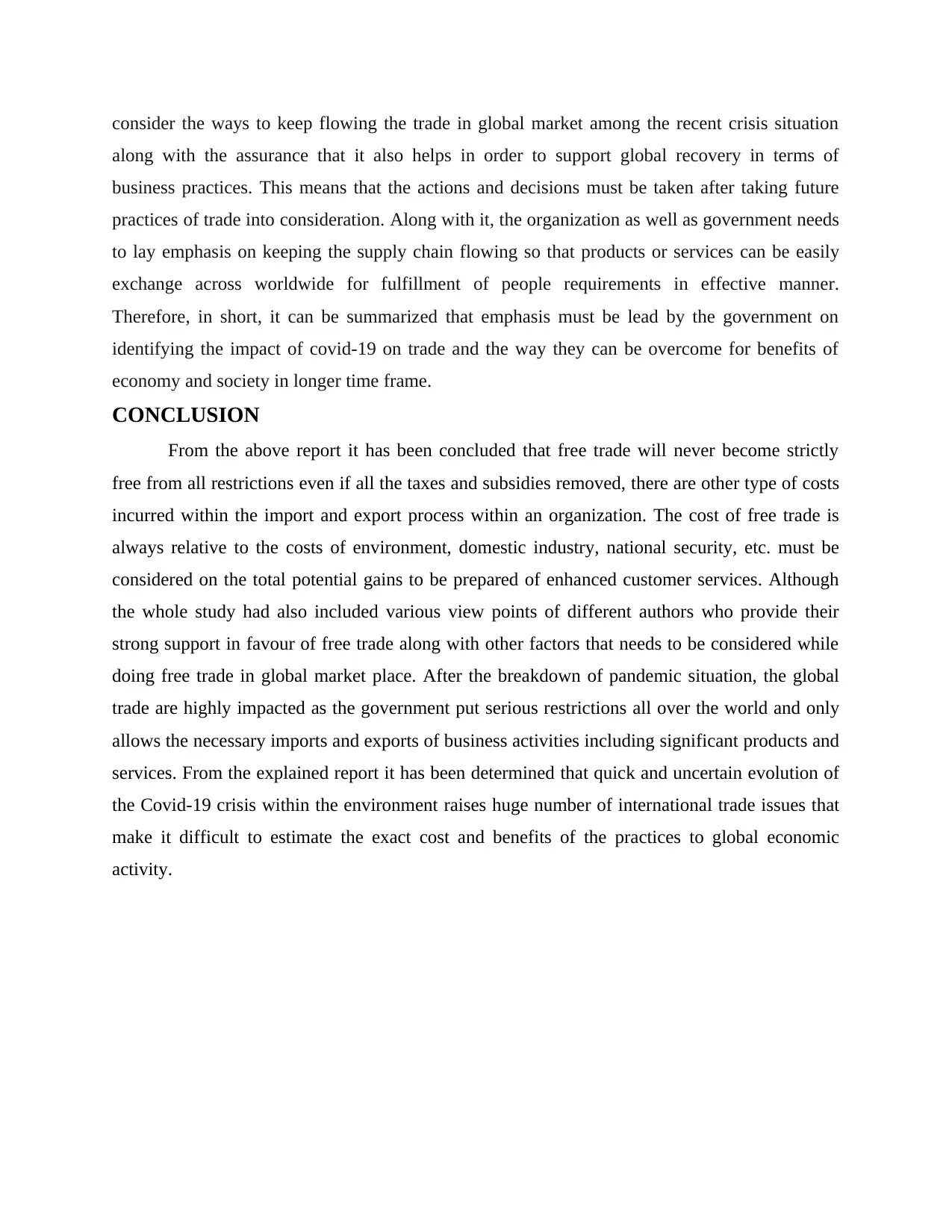
consider the ways to keep flowing the trade in global market among the recent crisis situation
along with the assurance that it also helps in order to support global recovery in terms of
business practices. This means that the actions and decisions must be taken after taking future
practices of trade into consideration. Along with it, the organization as well as government needs
to lay emphasis on keeping the supply chain flowing so that products or services can be easily
exchange across worldwide for fulfillment of people requirements in effective manner.
Therefore, in short, it can be summarized that emphasis must be lead by the government on
identifying the impact of covid-19 on trade and the way they can be overcome for benefits of
economy and society in longer time frame.
CONCLUSION
From the above report it has been concluded that free trade will never become strictly
free from all restrictions even if all the taxes and subsidies removed, there are other type of costs
incurred within the import and export process within an organization. The cost of free trade is
always relative to the costs of environment, domestic industry, national security, etc. must be
considered on the total potential gains to be prepared of enhanced customer services. Although
the whole study had also included various view points of different authors who provide their
strong support in favour of free trade along with other factors that needs to be considered while
doing free trade in global market place. After the breakdown of pandemic situation, the global
trade are highly impacted as the government put serious restrictions all over the world and only
allows the necessary imports and exports of business activities including significant products and
services. From the explained report it has been determined that quick and uncertain evolution of
the Covid-19 crisis within the environment raises huge number of international trade issues that
make it difficult to estimate the exact cost and benefits of the practices to global economic
activity.
along with the assurance that it also helps in order to support global recovery in terms of
business practices. This means that the actions and decisions must be taken after taking future
practices of trade into consideration. Along with it, the organization as well as government needs
to lay emphasis on keeping the supply chain flowing so that products or services can be easily
exchange across worldwide for fulfillment of people requirements in effective manner.
Therefore, in short, it can be summarized that emphasis must be lead by the government on
identifying the impact of covid-19 on trade and the way they can be overcome for benefits of
economy and society in longer time frame.
CONCLUSION
From the above report it has been concluded that free trade will never become strictly
free from all restrictions even if all the taxes and subsidies removed, there are other type of costs
incurred within the import and export process within an organization. The cost of free trade is
always relative to the costs of environment, domestic industry, national security, etc. must be
considered on the total potential gains to be prepared of enhanced customer services. Although
the whole study had also included various view points of different authors who provide their
strong support in favour of free trade along with other factors that needs to be considered while
doing free trade in global market place. After the breakdown of pandemic situation, the global
trade are highly impacted as the government put serious restrictions all over the world and only
allows the necessary imports and exports of business activities including significant products and
services. From the explained report it has been determined that quick and uncertain evolution of
the Covid-19 crisis within the environment raises huge number of international trade issues that
make it difficult to estimate the exact cost and benefits of the practices to global economic
activity.

1
⊘ This is a preview!⊘
Do you want full access?
Subscribe today to unlock all pages.

Trusted by 1+ million students worldwide
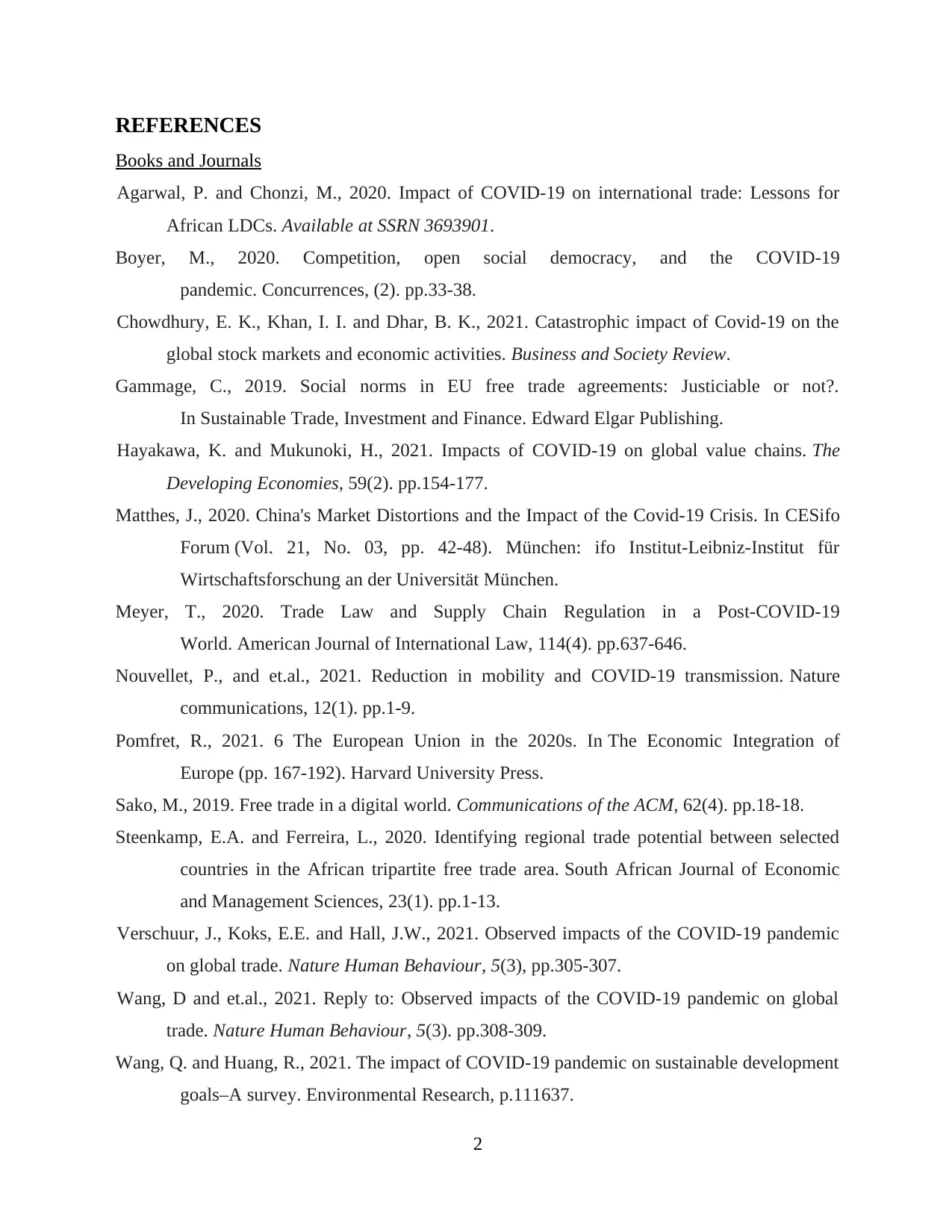
REFERENCES
Books and Journals
Agarwal, P. and Chonzi, M., 2020. Impact of COVID-19 on international trade: Lessons for
African LDCs. Available at SSRN 3693901.
Boyer, M., 2020. Competition, open social democracy, and the COVID-19
pandemic. Concurrences, (2). pp.33-38.
Chowdhury, E. K., Khan, I. I. and Dhar, B. K., 2021. Catastrophic impact of Covid‐19 on the
global stock markets and economic activities. Business and Society Review.
Gammage, C., 2019. Social norms in EU free trade agreements: Justiciable or not?.
In Sustainable Trade, Investment and Finance. Edward Elgar Publishing.
Hayakawa, K. and Mukunoki, H., 2021. Impacts of COVID‐19 on global value chains. The
Developing Economies, 59(2). pp.154-177.
Matthes, J., 2020. China's Market Distortions and the Impact of the Covid-19 Crisis. In CESifo
Forum (Vol. 21, No. 03, pp. 42-48). München: ifo Institut-Leibniz-Institut für
Wirtschaftsforschung an der Universität München.
Meyer, T., 2020. Trade Law and Supply Chain Regulation in a Post-COVID-19
World. American Journal of International Law, 114(4). pp.637-646.
Nouvellet, P., and et.al., 2021. Reduction in mobility and COVID-19 transmission. Nature
communications, 12(1). pp.1-9.
Pomfret, R., 2021. 6 The European Union in the 2020s. In The Economic Integration of
Europe (pp. 167-192). Harvard University Press.
Sako, M., 2019. Free trade in a digital world. Communications of the ACM, 62(4). pp.18-18.
Steenkamp, E.A. and Ferreira, L., 2020. Identifying regional trade potential between selected
countries in the African tripartite free trade area. South African Journal of Economic
and Management Sciences, 23(1). pp.1-13.
Verschuur, J., Koks, E.E. and Hall, J.W., 2021. Observed impacts of the COVID-19 pandemic
on global trade. Nature Human Behaviour, 5(3), pp.305-307.
Wang, D and et.al., 2021. Reply to: Observed impacts of the COVID-19 pandemic on global
trade. Nature Human Behaviour, 5(3). pp.308-309.
Wang, Q. and Huang, R., 2021. The impact of COVID-19 pandemic on sustainable development
goals–A survey. Environmental Research, p.111637.
2
Books and Journals
Agarwal, P. and Chonzi, M., 2020. Impact of COVID-19 on international trade: Lessons for
African LDCs. Available at SSRN 3693901.
Boyer, M., 2020. Competition, open social democracy, and the COVID-19
pandemic. Concurrences, (2). pp.33-38.
Chowdhury, E. K., Khan, I. I. and Dhar, B. K., 2021. Catastrophic impact of Covid‐19 on the
global stock markets and economic activities. Business and Society Review.
Gammage, C., 2019. Social norms in EU free trade agreements: Justiciable or not?.
In Sustainable Trade, Investment and Finance. Edward Elgar Publishing.
Hayakawa, K. and Mukunoki, H., 2021. Impacts of COVID‐19 on global value chains. The
Developing Economies, 59(2). pp.154-177.
Matthes, J., 2020. China's Market Distortions and the Impact of the Covid-19 Crisis. In CESifo
Forum (Vol. 21, No. 03, pp. 42-48). München: ifo Institut-Leibniz-Institut für
Wirtschaftsforschung an der Universität München.
Meyer, T., 2020. Trade Law and Supply Chain Regulation in a Post-COVID-19
World. American Journal of International Law, 114(4). pp.637-646.
Nouvellet, P., and et.al., 2021. Reduction in mobility and COVID-19 transmission. Nature
communications, 12(1). pp.1-9.
Pomfret, R., 2021. 6 The European Union in the 2020s. In The Economic Integration of
Europe (pp. 167-192). Harvard University Press.
Sako, M., 2019. Free trade in a digital world. Communications of the ACM, 62(4). pp.18-18.
Steenkamp, E.A. and Ferreira, L., 2020. Identifying regional trade potential between selected
countries in the African tripartite free trade area. South African Journal of Economic
and Management Sciences, 23(1). pp.1-13.
Verschuur, J., Koks, E.E. and Hall, J.W., 2021. Observed impacts of the COVID-19 pandemic
on global trade. Nature Human Behaviour, 5(3), pp.305-307.
Wang, D and et.al., 2021. Reply to: Observed impacts of the COVID-19 pandemic on global
trade. Nature Human Behaviour, 5(3). pp.308-309.
Wang, Q. and Huang, R., 2021. The impact of COVID-19 pandemic on sustainable development
goals–A survey. Environmental Research, p.111637.
2
Paraphrase This Document
Need a fresh take? Get an instant paraphrase of this document with our AI Paraphraser

3
1 out of 11
Related Documents
Your All-in-One AI-Powered Toolkit for Academic Success.
+13062052269
info@desklib.com
Available 24*7 on WhatsApp / Email
![[object Object]](/_next/static/media/star-bottom.7253800d.svg)
Unlock your academic potential
Copyright © 2020–2026 A2Z Services. All Rights Reserved. Developed and managed by ZUCOL.




